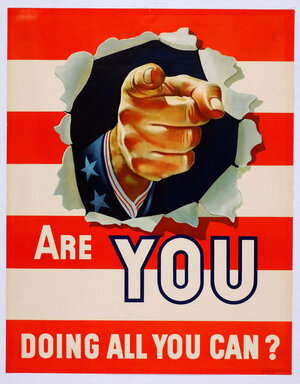
A few months ago, a professor at Notre Dame wrote a fascinating opinion piece in The New York Times that explored the growing practice of casting the fight to prevent climate change as the equivalent of war, and specifically World War II. It's a good read for today, Veteran's Day, when we honor men and women who've served in our nation's many wars, right up to the recent conflicts in Iraq and Afghanistan. The author, Roy Scranton, reminds us of the vast and bloody upheaval of the World War II years, at home and abroad, and then goes on to say that full-scale mobilization against climate change, while certainly necessary, may in fact be an "order of magnitude larger and more complex than America’s military mobilization during World War II" and may bring with it "social upheaval, violence, censorship, curtailed freedoms, dubious compromises and radical changes in American culture and politics."
It's the kind of hard-headed, pessimistic op-ed that pleases no one, except perhaps the fatalistic who will respond, see, it's just too much trouble. Let's let it ride. Hope for a (techno) miracle. G-d's will and all that.
Professor Scranton may be right, that tackling climate change will be a real ferocious bear and not some win-win scenario denied us by recalcitrant politicians. Let me add that Americans seem far less willing to make sacrifices for the country than they were in the patriotic WW-II era. For all our whining, we've got it pretty good compared to our grandparents. We're kind of spoiled, actually. There's no required national service or draft, and few rituals other than watching the Super Bowl or fireworks on the Fourth of July bind us together as a people. Granted, we claim to be worried about climate change, but support for going "over the top" to stop it falters when the bill comes due. In a University of Chicago poll last year, less than a quarter of folks are willing to pay $40 per month to clobber this enemy. Fifty-seven percent will contribute a buck monthly. Buy Climate War Bonds!?
It's the kind of hard-headed, pessimistic op-ed that pleases no one, except perhaps the fatalistic who will respond, see, it's just too much trouble. Let's let it ride. Hope for a (techno) miracle. G-d's will and all that.
Professor Scranton may be right, that tackling climate change will be a real ferocious bear and not some win-win scenario denied us by recalcitrant politicians. Let me add that Americans seem far less willing to make sacrifices for the country than they were in the patriotic WW-II era. For all our whining, we've got it pretty good compared to our grandparents. We're kind of spoiled, actually. There's no required national service or draft, and few rituals other than watching the Super Bowl or fireworks on the Fourth of July bind us together as a people. Granted, we claim to be worried about climate change, but support for going "over the top" to stop it falters when the bill comes due. In a University of Chicago poll last year, less than a quarter of folks are willing to pay $40 per month to clobber this enemy. Fifty-seven percent will contribute a buck monthly. Buy Climate War Bonds!?

War metaphors have been overused by politicians in recent decades. In 1964, President Johnson declared "unconditional war" on poverty. President Nixon declared a War on Drugs in 1971. President Carter referred to the nation's struggles during the Arab oil embargo as "the moral equivalent of war." Then there's the perpetual War on Cancer, featuring valiant doctors and patients "fighting" the disease (with the offensive implication that anyone who succumbs to cancer didn't battle hard enough; news flash, survival is due to luck and the quality of medical care). I'm sure there's more; the wars against this and that problem -- all unsolved -- keep piling up. Perhaps it's best that we avoid these war metaphors, just as we should shy from characterizing our political opponents as Nazis. Let's leave war in the literal realm, where its awfulness can remain brutally undiluted by comparisons.
So, then, what do we call it, the epic national and worldwide response to climate change that is required? A campaign? No, too weak. A crusade? No, too controversial. The Green New Deal is catchy, but has acquired a socialist-commie tinge. Movement, mobilization, jihad? How about The Great Awakening? Whatever term is used for this period of rapid change, it should convey the sense that it's gonna be exciting, rough, tumultuous and unprecedented. Live Green or Die?
So, then, what do we call it, the epic national and worldwide response to climate change that is required? A campaign? No, too weak. A crusade? No, too controversial. The Green New Deal is catchy, but has acquired a socialist-commie tinge. Movement, mobilization, jihad? How about The Great Awakening? Whatever term is used for this period of rapid change, it should convey the sense that it's gonna be exciting, rough, tumultuous and unprecedented. Live Green or Die?
 RSS Feed
RSS Feed